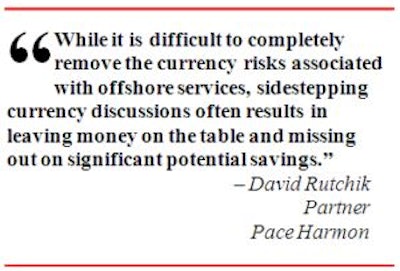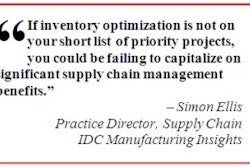
Vienna, VA — July 13, 2009 — Many enterprises are neglecting to factor currency implications into of their negotiations around information technology outsourcing (ITO) and business process outsourcing (BPO) deals, potentially adding significant financial risk and minimizing the very savings that have been a key impetus to use offshore services in the first place, according to a recent report from outsourcing advisory services firm Pace Harmon.
In its report, "Offshoring — Why Foreign Exchange Matters and What to Do about It," Pace Harmon says that companies must recognize the implications of minimizing or ignoring foreign exchange rates when negotiating and managing existing outsourcing deals in today's volatile economy.
The firm advises its clients to specifically focus on outsourcing currency implications and developed the report to help organizations realize the full financial benefits of their offshore outsourcing transactions.
Companies often overlook currency implications due to a lack of familiarity or comfort with the subject, complacence with the previous savings generated from labor arbitrage, or internal treasury/finance groups not playing a role in the transaction, according to Pace Harmon.
"Now, more than ever, yielding bottom-line results from an offshoring engagement is critical to companies' viability," said David Rutchik, a partner with Pace Harmon. "While it is difficult to completely remove the currency risks associated with offshore services, sidestepping currency discussions often results in leaving money on the table and missing out on significant potential savings."
The report explains the key benefits of weaving foreign exchange considerations into offshore transaction negotiations. For example, offshore providers typically deliver services from emerging market locations and pay their resources in local currency. Because of recent market fluctuations, many offshore providers' costs to deliver services have decreased substantially resulting in a financial windfall for the outsourcer that could be passed along, or at least shared, with the customer. On the other hand, during times when the dollar is worth less against emerging market currencies; a contract with payment tied to local currency would cost the company more.
Pace Harmon's report recommends that companies consider five currency deal structures to yield the best possible financial results: pay in U.S. dollars tied to the specific local currency; arrange for fixed payment in U.S. dollars; agree to band currency changes to a certain percentage in either direction; take a hybrid approach of averaging past exchange rates and apply local currency fluctuation to the prospective period; and engage in hedging.
Selecting the right option requires careful consideration of individual companies' risk profiles, cash flow positions, operating margins and other factors. Specifically, Pace Harmon advises organizations to closely examine the implications of the agreement term length, revenue generation location, relative size of the contract, and service provision location.
Pace Harmon's clients include Fortune 500 and select high growth middle-market companies spanning industries such as telecommunications, health care, financial services, manufacturing, technology, and energy.
The full report is available (no registration currently required) at www.paceharmon.com/docs/Currency_Considerations_in_Offshoring_-_May01F.pdf.
In its report, "Offshoring — Why Foreign Exchange Matters and What to Do about It," Pace Harmon says that companies must recognize the implications of minimizing or ignoring foreign exchange rates when negotiating and managing existing outsourcing deals in today's volatile economy.
The firm advises its clients to specifically focus on outsourcing currency implications and developed the report to help organizations realize the full financial benefits of their offshore outsourcing transactions.
Companies often overlook currency implications due to a lack of familiarity or comfort with the subject, complacence with the previous savings generated from labor arbitrage, or internal treasury/finance groups not playing a role in the transaction, according to Pace Harmon.
"Now, more than ever, yielding bottom-line results from an offshoring engagement is critical to companies' viability," said David Rutchik, a partner with Pace Harmon. "While it is difficult to completely remove the currency risks associated with offshore services, sidestepping currency discussions often results in leaving money on the table and missing out on significant potential savings."
The report explains the key benefits of weaving foreign exchange considerations into offshore transaction negotiations. For example, offshore providers typically deliver services from emerging market locations and pay their resources in local currency. Because of recent market fluctuations, many offshore providers' costs to deliver services have decreased substantially resulting in a financial windfall for the outsourcer that could be passed along, or at least shared, with the customer. On the other hand, during times when the dollar is worth less against emerging market currencies; a contract with payment tied to local currency would cost the company more.
Pace Harmon's report recommends that companies consider five currency deal structures to yield the best possible financial results: pay in U.S. dollars tied to the specific local currency; arrange for fixed payment in U.S. dollars; agree to band currency changes to a certain percentage in either direction; take a hybrid approach of averaging past exchange rates and apply local currency fluctuation to the prospective period; and engage in hedging.
Selecting the right option requires careful consideration of individual companies' risk profiles, cash flow positions, operating margins and other factors. Specifically, Pace Harmon advises organizations to closely examine the implications of the agreement term length, revenue generation location, relative size of the contract, and service provision location.
Pace Harmon's clients include Fortune 500 and select high growth middle-market companies spanning industries such as telecommunications, health care, financial services, manufacturing, technology, and energy.
The full report is available (no registration currently required) at www.paceharmon.com/docs/Currency_Considerations_in_Offshoring_-_May01F.pdf.









